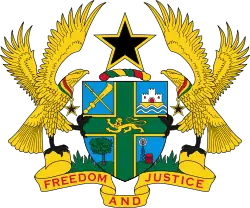1992 Ghanaian presidential election
Presidential elections were held in Ghana on 3 November 1992. They were the first contested elections held in the country since 1979, and only the fourth contested elections of any sort since the country gained independence in 1957.
| |||||||||||||||||||||||||
| Turnout | 50.16% | ||||||||||||||||||||||||
|---|---|---|---|---|---|---|---|---|---|---|---|---|---|---|---|---|---|---|---|---|---|---|---|---|---|
| |||||||||||||||||||||||||
_no_heading.svg.png.webp) | |||||||||||||||||||||||||
| |||||||||||||||||||||||||
 |
|---|
| Constitution |
|
|
Jerry Rawlings, who had led the country since taking power in a 1981 coup, had grudgingly agreed to hold multiparty elections earlier in the year.[1] Rawlings ran as the candidate of the Progressive Alliance, which included his National Democratic Congress, and won 58.4% of the vote, enough to win without the need for a runoff. Voter turnout was 50.2%.[2]
The opposition accused Rawlings and his supporters of engaging in massive fraud, including ballot-box stuffing and altering results after they were certified. Nonetheless, international observers pronounced the elections free and fair.[1]
Results
| Candidate | Party | Votes | % | |
|---|---|---|---|---|
| Jerry Rawlings | Progressive Alliance (NDC–NCP–EGLE) | 2,323,135 | 58.40 | |
| Albert Adu Boahen | New Patriotic Party | 1,204,764 | 30.29 | |
| Hilla Limann | People's National Convention | 266,710 | 6.70 | |
| Kwabena Darko | National Independence Party | 113,629 | 2.86 | |
| Emmanuel Erskine | People's Heritage Party | 69,827 | 1.76 | |
| Total | 3,978,065 | 100.00 | ||
| Valid votes | 3,978,065 | 96.37 | ||
| Invalid/blank votes | 149,811 | 3.63 | ||
| Total votes | 4,127,876 | 100.00 | ||
| Registered voters/turnout | 8,229,902 | 50.16 | ||
| Source: Nohlen et al. | ||||
References
- "Ghana's Leader Wins Election as President". The New York Times. 6 November 1992.
- Dieter Nohlen, Michael Krennerich & Bernhard Thibaut (1999) Elections in Africa: A data handbook, p. 438 ISBN 0-19-829645-2
_(cropped).jpg.webp)
